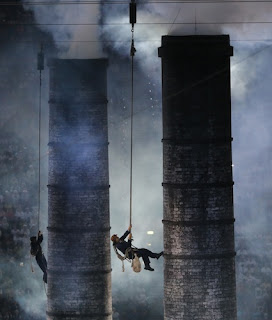Monday 30 July 2012
RIP Chris Marker
He liked the fragility of those moments suspended in time. Those
memories whose only function had been to leave behind nothing but
memories. He wrote: I've been round the world several times and now only
banality still interests me. On this trip I've tracked it with the
relentlessness of a bounty hunter. At dawn we'll be in Tokyo.
telescopes in the mist
As for me, I am busy pointing my telescope through the bloody mist at a mirage of the nineteenth century, which I am trying to reproduce based on the characteristics that it will manifest in a future state of the world, liberated from magic. Of course, I first have to build myself this telescope.
Friday 27 July 2012
protocols of escape / suffocating town
...besides, people around here are obsessed with anything like that -safari parks, dolphinaria, stunt flying, it's all the same to them, they're forever dressing up as beefeaters or Hanoverian infantry and re-enacting the battle of Austerlitz...
ballard/ the unlimited dream company
the "political action" which is at stake ... is ... liturgy [ returned to its etymological meaning of "public practice".]
agamben / the kingdom & the glory
ballard/ the unlimited dream company
the "political action" which is at stake ... is ... liturgy [ returned to its etymological meaning of "public practice".]
agamben / the kingdom & the glory
Thursday 26 July 2012
zangezi
In 1923, Vladimir Tatlin designed, directed, and starred in a performance of Velimir
Khlebnikov's play Zangezi that was presented by an amateur
troupe at the Museum of Artistic Culture in Petrograd. Khlebnikov
had died earlier in the year, and the performance was to be
a memorial to Tatlin's favorite poet. To Khlebnikov's construction
of words, where sound was the principle building element, Tatlin
attempted to find a counterpart in tangible construction, built
with a variety of materials in different surfaces and shapes.
Tuesday 24 July 2012
Monday 23 July 2012
Sunday 22 July 2012
gloria
glo·ry
1.
very great praise, honor, or distinction bestowed by common consent; renown: to win glory on the field of battle.
2.
3.
adoring praise or worshipful thanksgiving: Give glory to God.
4.
resplendent beauty or magnificence: the glory of autumn.
5.
a state of great splendor, magnificence, or prosperity.
Saturday 21 July 2012
Friday 20 July 2012
carved balls
http://www.georgehart.com/virtual-polyhedra/neolithic.html
http://www.ianbeggarchitect.co.uk/phdi/p1.nsf/supppages/1430?opendocument&part=3
http://www.neverendingbooks.org/index.php/scottish-solids-final-comments.html
http://www.ianbeggarchitect.co.uk/phdi/p1.nsf/supppages/1430?opendocument&part=3
http://www.neverendingbooks.org/index.php/scottish-solids-final-comments.html
Thursday 19 July 2012
Saturday 14 July 2012
The thirde tractate of the offices of the comyn peple. The fyrst chapitre is of the office of the labourers and werkemen.
This booke conteyneth. iiii. traytees/ The first traytee is of the Invencion
of this playe of the chesse/ and conteyneth. iii. chapitres.
The Project Gutenberg EBook of Game and Playe of the Chesse, by Caxton
seduction by abstraction
Then I showed her my 'records' and spoke - very well, I think - about the beauty of the square, the cube, the straight line. She was listening so charmingly pinkly - and suddenly from her blue eyes came a tear, another, a third - straight onto the open page [page 7]. The ink ran. Well now I'll have to rewrite it.
Zamyatin / We / 19
Zamyatin / We / 19
Friday 13 July 2012
Friday 6 July 2012
Wednesday 4 July 2012
lake of the ingots of gold
One of the most singular things that we have been told about the island of Zabaj, is that which concerns one of its former kings. This king was called the Maharaja. His palace faced onto a thalaj which emanates from the sea; one means by thalaj an estuary resembling those which the Tigris forms when it passes by Baghdad and Basra, an estuary which the salt water of the sea invades at high tide and which is fresh at low tide. This water formed a small lagoon adjoining the palace of the king. Every morning the steward is brought before the king and offers him an ingot of gold in the form of a brick. Each brick weighs a certain number of mann, the amount of which is not known to me. Next, in the presence of the king, the steward throws this brick into the lagoon. At high tide, the water covers this brick and all the other bricks which are piled there, so that they cannot be seen, and when the water goes down, the bricks appear and shine in the sun. When the king gives an audience he sits in a room which overlooks the lake with his face turned towards the water. This custom must never be interrupted: every day a golden brick is thrown into this lake and as long as the king lives, the bricks are not touched.
At his death, however, his successor extracts the bricks without leaving any. They are counted and melted down, and the gold is distributed to the princes of the royal family, both men and women, to their children, their officers and their eunuchs, in proportion to their rank and the prerogatives attached to their various functions. Any which remains is given to the poor and the sick. They take care to make a record of the golden bricks and their total weight. It is written down that so and so, the king, had reigned so many years, and they had thrown so many bricks into the royal lake, and weighing so much; and that after his death these bricks had been divided up amongst the court and the royal family. lt was a great honour for the king who had reigned the greatest number of years and had amassed the greatest number of golden bricks.
|
|
Surely there is a vein for the silver,
and a place for gold [where] they fine [it].
|
|
|
Iron is taken out of
the earth, and brass [is] molten [out of] the stone.
|
|
|
He setteth an end to
darkness, and searcheth out all perfection: the stones of darkness, and the
shadow of death.
|
|
|
The flood breaketh
out from the inhabitant; [even the waters] forgotten of the foot: they are
dried up, they are gone away from men.
|
|
|
[As for] the earth,
out of it cometh bread: and under it is turned up as it were fire.
|
|
|
The stones of it
[are] the place of sapphires: and it hath dust of gold.
|
|
|
[There is] a path
which no fowl knoweth, and which the vulture's eye hath not seen:
|
|
|
The lion's whelps
have not trodden it, nor the fierce lion passed by it.
|
|
|
He putteth forth his
hand upon the rock; he overturneth the mountains by the roots.
|
|
|
He cutteth out
rivers among the rocks; and his eye seeth every precious thing.
|
|
|
He bindeth the
floods from overflowing; and [the thing that is] hid bringeth he forth to
light.
|
|
¶
|
But where shall
wisdom be found? and where [is] the place of understanding?
|
|
|
Man knoweth not the
price thereof; neither is it found in the land of the living.
|
|
|
The depth saith, It
[is] not in me: and the sea saith, [It is] not with me.
|
|
|
It cannot be gotten
for gold, neither shall silver be weighed [for] the price thereof.
|
|
|
It cannot be valued
with the gold of Ophir, with the precious onyx, or the sapphire.
|
|
|
The gold and the
crystal cannot equal it: and the exchange of it [shall not be for] jewels of
fine gold.
|
|
|
No mention shall be
made of coral, or of pearls: for the price of wisdom [is] above rubies.
|
|
|
The topaz of
Ethiopia shall not equal it, neither shall it be valued with pure gold.
|
|
|
Whence then cometh
wisdom? and where [is] the place of understanding?
|
|
|
Seeing it is hid
from the eyes of all living, and kept close from the fowls of the air.
|
|
|
Destruction and
death say, We have heard the fame thereof with our ears.
|
|
|
God understandeth
the way thereof, and he knoweth the place thereof.
|
|
|
For he looketh to
the ends of the earth, [and] seeth under the whole heaven;
|
|
|
To make the weight
for the winds; and he weigheth the waters by measure.
|
|
|
When he made a
decree for the rain, and a way for the lightning of the thunder:
|
|
|
Then did he see it,
and declare it; he prepared it, yea, and searched it out.
|
|
|
And unto man he
said, Behold, the fear of the Lord, that [is] wisdom; and to depart from evil
[is] understanding.
|
Labels:
brick,
crystal,
economy,
golden section,
heliotrpoe,
jewel,
job,
patrimony,
Simon Wells,
teleology
Tuesday 3 July 2012
Monday 2 July 2012
Subscribe to:
Posts (Atom)





























 http://esgs.free.fr/uk/sd.htm
http://esgs.free.fr/uk/sd.htm


